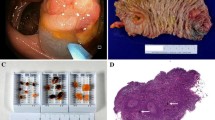Abstract
Purposes
We focused on the possible benefits of laparoscopic surgery to protect against isolated tumor cells (ITC) generated by surgical manipulation in comparison to open surgery.
Methods
We performed conventional open surgery and laparoscopic surgery for 25 and 8 cases of colorectal cancer (CRC), respectively. We compared the presence of ITC in the peripheral blood (PB) immediately after surgery via quantitative reverse transcriptase-polymerase chain reaction (RT-PCR) for a representative epithelial marker, carcinoembryonic antigen (CEA).
Results
In the 25 patients who underwent open surgery, 8 of the 10 cases with metastasis were positive for ITC in PB, while 13 of the 15 cases without metastasis were negative for ITC. Therefore, we validated that there was a significant clinical usefulness for the detection of ITC in the prediction of metastasis (p = 0.0024). We limited our subsequent analysis to the CRC cases with a Dukes stage of B or C to avoid differences due to the background, and we found that the positive ITC rate for metastasis was higher in the 19 patients who underwent open surgery (42.1 %) than in the 8 who underwent laparoscopic surgery (37.5 %).
Conclusions
The short observation period, especially in the laparoscopic surgery group, and the inadequate number of cases limit the ability to draw any definitive conclusions; however, laparoscopic surgery appears to minimize the surgical manipulation, thus leading to reduced ITC from primary CRC compared with open surgery.

Similar content being viewed by others
References
Inomata M, Yasuda K, Shiraishi N, Kitano S. Clinical evidences of laparoscopic versus open surgery for colorectal cancer. Jpn J Clin Oncol. 2009;39:471–7.
Kitano S, Inomata M. Is laparoscopic surgery acceptable for advanced colon cancer? Cancer Sci. 2009;100:567–71.
Fleshman J, Sargent DJ, Green E, Anvari M, Stryker SJ, Beart RW Jr, et al. Laparoscopic colectomy for cancer is not inferior to open surgery based on 5-year data from the COST study group trial. Ann Surg. 2007;246:655–62. discussion 62–4.
Stocchi L, Nelson H, Young-Fadok TM, Larson DR, Ilstrup DM. Safety and advantages of laparoscopic vs. open colectomy in the elderly: matched-control study. Dis Colon Rectum. 2000;43:326–32.
Hayashi N, Egami H, Kai M, Kurusu Y, Takano S, Ogawa M. No-touch isolation technique reduces intraoperative shedding of tumor cells into the portal vein during resection of colorectal cancer. Surgery. 1999;125:369–74.
Galan M, Vinolas N, Colomer D, Soler G, Munoz M, Longaron R, et al. Detection of occult breast cancer cells by amplification of CK19 mRNA by reverse transcriptase-polymerase chain reaction: role of surgical manipulation. Anticancer Res. 2002;22:2877–84.
Mori M, Mimori K, Ueo H, Karimine N, Barnard GF, Sugimachi K, et al. Molecular detection of circulating solid carcinoma cells in the peripheral blood: the concept of early systemic disease. Int J Cancer. 1996;68:739–43.
Mori M, Mimori K, Inoue H, Barnard GF, Tsuji K, Nanbara S, et al. Detection of cancer micrometastases in lymph nodes by reverse transcriptase-polymerase chain reaction. Cancer Res. 1995;55:3417–20.
Mori M, Mimori K, Ueo H, Tsuji K, Shiraishi T, Barnard GF, et al. Clinical significance of molecular detection of carcinoma cells in lymph nodes and peripheral blood by reverse transcription-polymerase chain reaction in patients with gastrointestinal or breast carcinomas. J Clin Oncol. 1998;16:128–32.
Mimori K, Kataoka A, Yamaguchi H, Masuda N, Kosaka Y, Ishii H, et al. Preoperative u-PAR gene expression in bone marrow indicates the potential power of recurrence in breast cancer cases. Ann Surg Oncol. 2009;16:2035–41.
Mimori K, Fukagawa T, Kosaka Y, Kita Y, Ishikawa K, Etoh T, et al. Hematogenous metastasis in gastric cancer requires isolated tumor cells and expression of vascular endothelial growth factor receptor-1. Clin Cancer Res. 2008;14:2609–16.
Bauer TW, Liu W, Fan F, Camp ER, Yang A, Somcio RJ, et al. Targeting of urokinase plasminogen activator receptor in human pancreatic carcinoma cells inhibits c-Met- and insulin-like growth factor-I receptor-mediated migration and invasion and orthotopic tumor growth in mice. Cancer Res. 2005;65:7775–81.
Mimori K, Fukagawa T, Kosaka Y, Ishikawa K, Iwatsuki M, Yokobori T, et al. A large-scale study of MT1-MMP as a marker for isolated tumor cells in peripheral blood and bone marrow in gastric cancer cases. Ann Surg Oncol. 2008;15:2934–42.
Mimori K, Ueo H, Shirasaka C, Mori M. Clinical significance of MT1-MMP mRNA expression in breast cancer. Oncol Rep. 2001;8:401–3.
Acknowledgments
This work was supported in part by the following grants and foundations: CREST, Japan Science and Technology Agency (JST); Japan Society for the Promotion of Science (JSPS) Grant-in-Aid for Scientific Research, Grant Numbers 20390360, 20591547, 20790960, 21591644, 21791295, 21791297, 215921014 and 21679006; and the Funding Program for Next Generation World-Leading Researchers (LS094); and NEDO (New Energy and Industrial Technology Development Organization) Technological Development for Chromosome Analysis.
Conflict of interest
K. Mimori and co-authors have no conflicts of interest to declare.
Author information
Authors and Affiliations
Corresponding author
Rights and permissions
About this article
Cite this article
Akiyoshi, S., Mimori, K., Sudo, T. et al. Laparoscopic surgery minimizes the surgical manipulation of isolated tumor cells leading to decreased metastasis compared to open surgery for colorectal cancer. Surg Today 43, 20–25 (2013). https://doi.org/10.1007/s00595-012-0389-0
Received:
Accepted:
Published:
Issue Date:
DOI: https://doi.org/10.1007/s00595-012-0389-0




